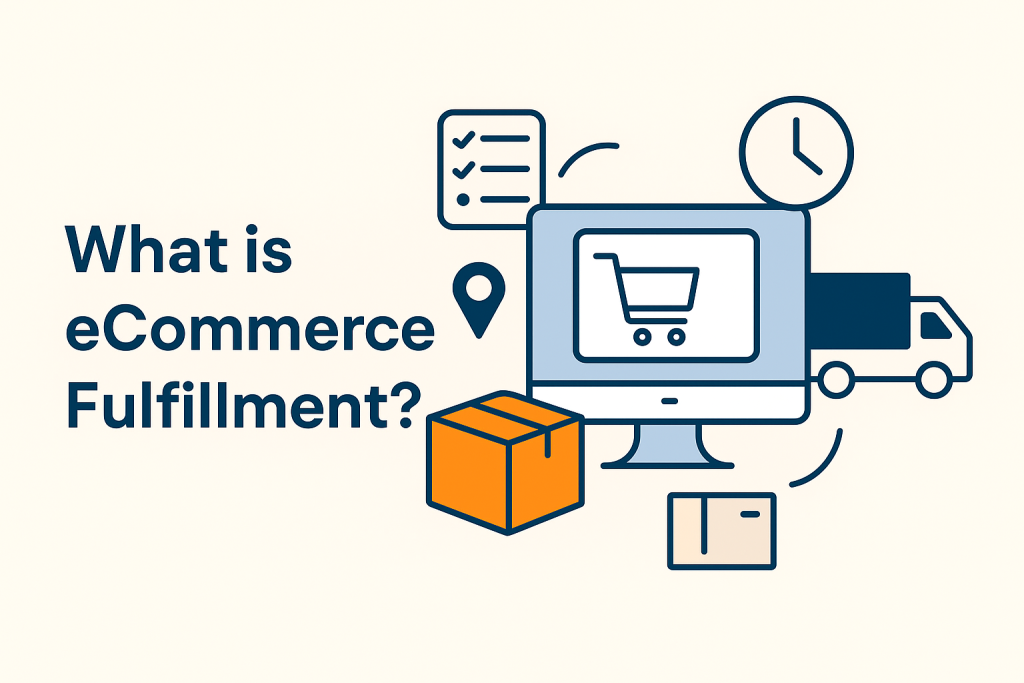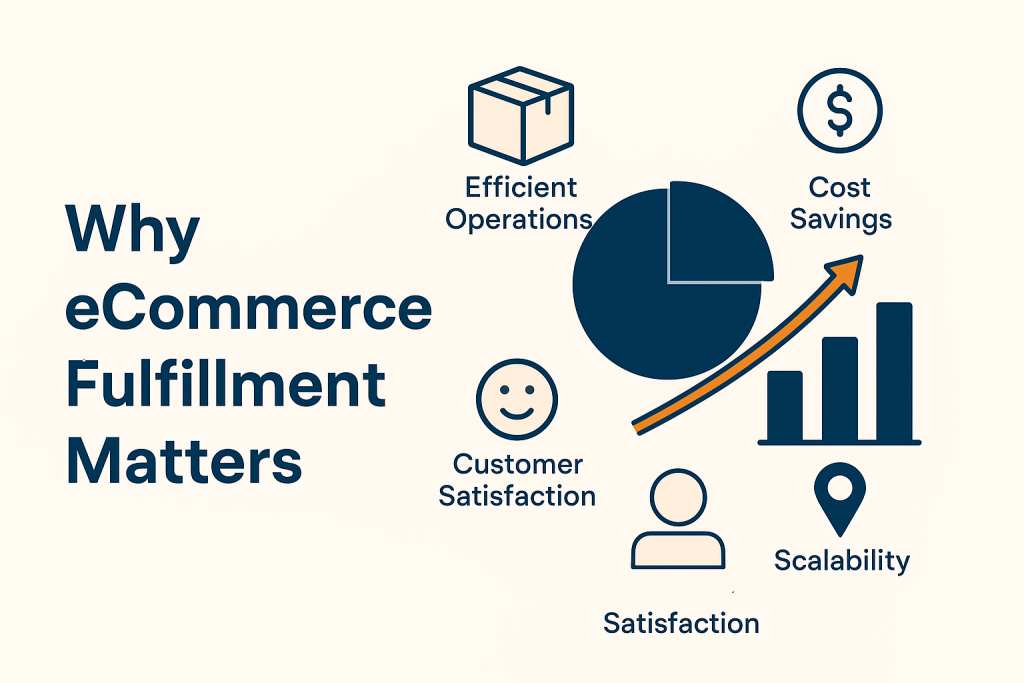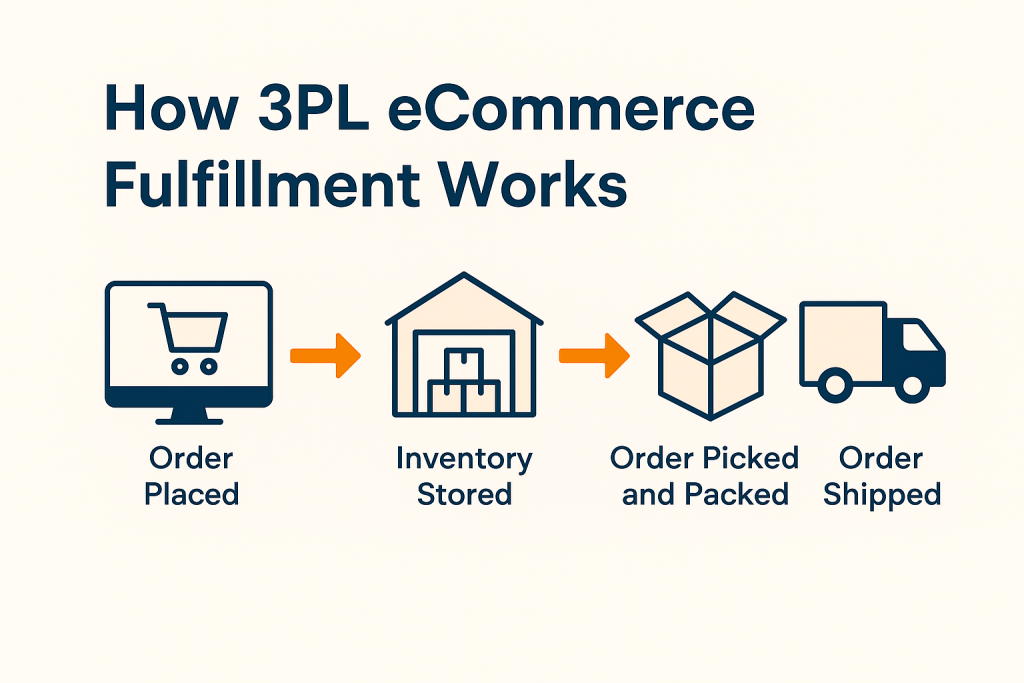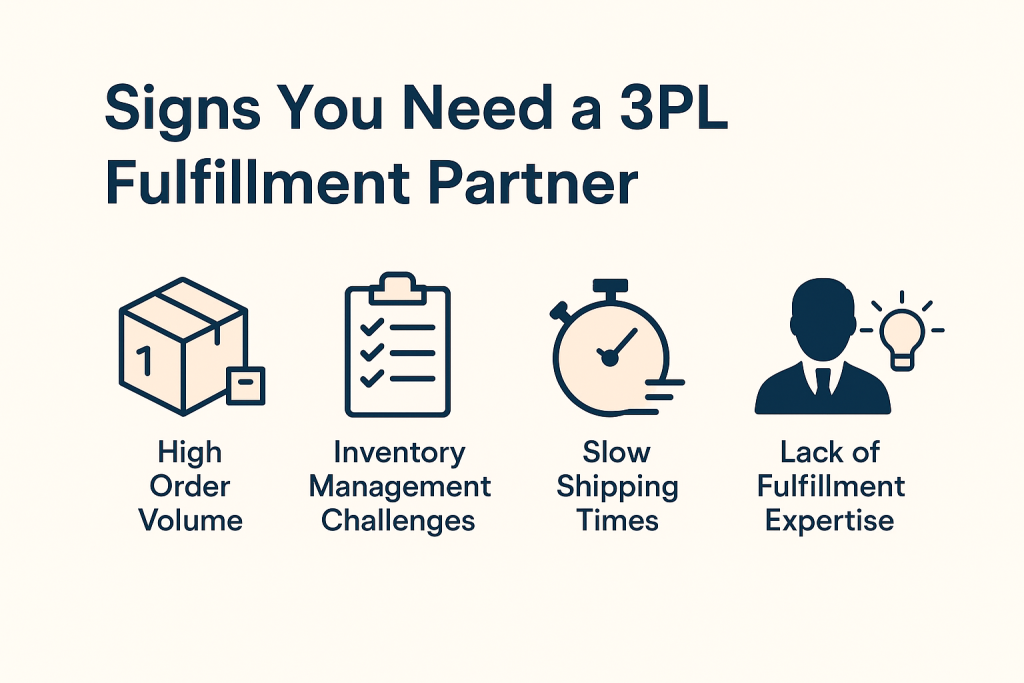In the fast-paced world of online shopping, delivering a smooth and timely customer experience is essential. That’s where eCommerce fulfillment comes into play. Whether you’re a small business owner or a growing DTC brand, understanding the ins and outs of eCommerce and fulfillment can be the difference between retaining loyal customers and losing them due to delays and errors. This guide will explore everything you need about eCommerce fulfillment services, focusing on 3PL eCommerce fulfillment and how it can simplify your operations.
Read: Shopify Plus eCommerce Agency
I. What is eCommerce Fulfillment?
eCommerce fulfillment refers to receiving, processing, packing, and shipping online orders to customers. It covers everything from storing inventory in a warehouse to managing returns. The goal is to ensure the correct product reaches the right customer in the shortest time possible.

The Core Components:
- Inventory Storage – Warehousing of products
- Order Processing – Receiving and organizing orders
- Picking and Packing – Assembling the right items securely
- Shipping – Sending orders to customers via courier
- Returns Management – Handling exchanges and refunds
This process is integral to the success of any online business, as it directly impacts customer satisfaction and brand reputation.
II. Why eCommerce Fulfillment Matters
With the rise of next-day and same-day delivery expectations, the bar for eCommerce and fulfillment has never been higher. Customers demand fast, error-free deliveries, and businesses must rise to the challenge.

Efficient eCommerce fulfillment services lead to:
- Faster order delivery
- Reduced cart abandonment
- Higher customer retention
- Increased positive reviews
- Scalable operations
Moreover, poor eCommerce order fulfillment can lead to negative feedback, lost sales, and operational chaos. That’s why choosing the right fulfillment strategy or partner is crucial.
III. What is a 3PL in eCommerce?
3PL Third-Party Logistics providers manage all or part of your eCommerce fulfillment process. By outsourcing logistics, businesses can focus on growth, marketing, and product development, while 3PLs handle the heavy lifting.
Key Functions of a 3PL Partner:
- Warehousing & Inventory Management
- Pick, Pack, and Ship Services
- Real-Time Tracking and Integration with eCommerce Platforms
- Returns and Reverse Logistics
- Data and Analytics for Forecasting
3PL eCommerce fulfillment is especially beneficial for businesses experiencing rapid growth or looking to expand into new markets without investing heavily in infrastructure.
IV. Benefits of eCommerce Fulfillment Services
Using professional eCommerce fulfillment services provides a wide array of advantages, including:
| Benefit | Description |
| Cost Savings | Reduced need for in-house warehousing and staffing overhead. |
| Faster Delivery | Fulfillment centers close to customers lead to shorter shipping times. |
| Scalability | Easily handle growth and seasonal spikes without major changes. |
| Accuracy & Efficiency | Minimized order errors and streamlined processes through automation. |
| Technology Integration | Real-time tracking, order syncing, and automated inventory |
V. How 3PL eCommerce Fulfillment Works
Understanding the process behind 3PL eCommerce fulfillment helps businesses make informed decisions. Here’s how it typically works:

- Inventory is sent to the 3PL warehouse.
- Your online store is integrated with the 3PL system.
- Orders are automatically received and processed.
- Items are picked, packed, and labeled according to your brand guidelines.
- Orders are shipped using the best carrier options.
- Tracking updates are synced back to your store and sent to customers.
This streamlined process lets you focus on growing your brand while the 3PL handles the backend.
VI. Signs You Need a 3PL Fulfillment Partner
Is switching to 3PL eCommerce fulfillment worth the time? Here are some telltale signs:

- You’re overwhelmed with order volume
- Delivery times are slipping
- You’re running out of storage space
- Returns are becoming challenging to manage
- You want to expand to new regions or countries
In these cases, outsourcing your eCommerce order fulfillment to a 3PL provider can help restore balance and efficiency to your business.
VII. How to Choose the Right eCommerce Fulfillment Services
When selecting a fulfillment partner, consider the following:
| Criteria | Why It Matters |
| Fulfillment Center Locations | Closer locations mean faster delivery and reduced shipping costs. |
| Technology and Integration | Seamless connection to your store for real-time updates. |
| Transparent Pricing | No hidden fees, clear contract terms. |
| Customer Support | Responsive support when issues arise. |
| Industry Experience | Knowledge of your product type and sales channels. |
Choosing the right eCommerce fulfillment services is more than cost; look for a partner to support your business as it evolves.
VIII. Common Challenges in eCommerce Fulfillment
Even the best systems can face hiccups. Here are common issues in eCommerce and fulfillment, and how 3PL services help solve them:
| Challenge | Solution Provided by 3PL |
| Inventory Errors | Real-time tracking and automated inventory updates |
| Shipping Delays | Multiple carrier options and priority shipping |
| Return Management | Streamlined reverse logistics processes |
| Inaccurate Orders | Barcode scanning and quality checks |
By proactively addressing these challenges, 3PL providers ensure your eCommerce fulfillment stays efficient and reliable.
IX. Final Thoughts
In today’s competitive digital landscape, eCommerce fulfillment is not just a backend process; it’s a key part of your brand’s identity and customer experience. Leveraging 3PL eCommerce fulfillment can unlock new efficiency, scalability, and customer satisfaction levels.
Whether just starting or managing thousands of monthly orders, investing in the right eCommerce fulfillment services can fuel your growth and set you apart in a crowded market.
Need help getting started with reliable eCommerce and fulfillment solutions? Consider evaluating your current logistics strategy and contacting trusted 3PL partners today.
Frequently Asked Questions (FAQs)
1. What is the difference between eCommerce fulfillment and 3PL fulfillment?
eCommerce fulfillment refers to storing, picking, packing, and shipping orders for online sales. 3PL eCommerce fulfillment refers to outsourcing this process to a third-party logistics provider.
2. How do I know if I need a 3PL for my online store?
If you’re struggling to keep up with order volume, facing frequent shipping delays, or want to expand into new markets without investing in infrastructure, consider a 3PL partner.
3. What are the costs involved in eCommerce fulfillment services?
Costs vary depending on order volume, storage needs, shipping destinations, and services required. Transparent 3PL providers usually offer pricing based on storage, pick-and-pack, and shipping fees.
4. Can 3PL services integrate with my eCommerce platform?
Yes, most modern 3PL providers offer seamless integration with popular platforms like Shopify, WooCommerce, BigCommerce, and others, allowing real-time syncing of orders and inventory.
5. Are eCommerce fulfillment services scalable for peak seasons?
Absolutely. One of the most significant advantages of using eCommerce fulfillment services is scalability. 3PLs are built to handle sudden spikes during holidays or sales events without compromising service quality.
If you’re serious about growing your eCommerce website, building trust online, and attracting more clients, now is the time to invest in professional website design. Contact Softpulse Infotech, now the best Shopify Experts company.



